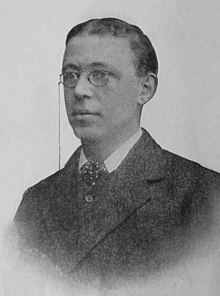| Revision as of 11:20, 14 December 2021 editLugnuts (talk | contribs)Extended confirmed users, Pending changes reviewers1,509,055 editsNo edit summary← Previous edit | Revision as of 11:20, 14 December 2021 edit undoLugnuts (talk | contribs)Extended confirmed users, Pending changes reviewers1,509,055 edits Adding local short description: "British politician", overriding Wikidata description "British politician (1878-1928)" (Shortdesc helper)Next edit → | ||
| Line 1: | Line 1: | ||
| {{Short description|British politician}} | |||
| {{Use dmy dates|date=March 2018}} | {{Use dmy dates|date=March 2018}} | ||
| {{Use British English|date=March 2018}} | {{Use British English|date=March 2018}} | ||
Revision as of 11:20, 14 December 2021
British politician

Benjamin Charles Spoor PC (2 June 1878 – 22 December 1928) was a British Labour Party politician. He took a particular interest in India.
Born in Witton Park, County Durham, he went to Elmfield College, York, and came from a family of Primitive Methodists. An engineer by training, he later went into business as a builder's merchant. Before entering politics, he was a lay preacher in the Methodist Church.
At the 1918 general election, he was elected as Member of Parliament for Bishop Auckland, and held the seat until his death at the age of fifty. In Parliament, he found himself at odds with many Labour MPs and contemplated joining the Liberal Party. He was the Parliamentary Secretary to the Treasury and Chief Whip in 1924, when he was made a Privy Councillor.
He had suffered from poor health since contracting malaria at Salonika during World War I. On a visit to London in December 1928, he was found dead in bed at the Regent Palace Hotel. At the inquest, his son said that his father had taken to drinking heavily. His death, it was decided, was due to syncope from disease of the heart and liver, due to chronic alcoholism.
References
- The Times, 24 December 1928 (obituary), 27 December 1928 (inquest report)
- The Fall of Lloyd George: The Political Crisis of 1922
External links
- Hansard 1803–2005: contributions in Parliament by Ben Spoor
| Parliament of the United Kingdom | ||
|---|---|---|
| Preceded byHenry Havelock-Allan, Bt | Member of Parliament for Bishop Auckland 1918–1928 |
Succeeded byRuth Dalton |
| Political offices | ||
| Preceded byBolton Eyres-Monsell | Parliamentary Secretary to the Treasury 1924 |
Succeeded byBolton Eyres-Monsell |